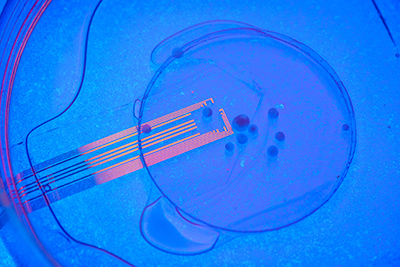Mini human brains implanted in mice respond to light the animals see
Date: 9.1.2023
Miniature human brains, grown from stem cells and implanted into living mice, have for the first time been shown to respond to things the mice were seeing. The scientists were able to watch the responses in real time thanks to specialized graphene electrodes.
 In recent years, scientists have found a way to revert adult skin cells into an immature state that can then be coaxed to form almost any other type of cell in the body. These induced pluripotent stem cells can be used to make tiny but functioning versions of organs, called organoids, in the lab.
In recent years, scientists have found a way to revert adult skin cells into an immature state that can then be coaxed to form almost any other type of cell in the body. These induced pluripotent stem cells can be used to make tiny but functioning versions of organs, called organoids, in the lab.
Last October, a team from Stanford implanted human brain organoids into rats for the first time, and found that the human cells formed connections with the rat neurons. In the new study, scientists at the University of California (UC) San Diego built on that work by showing that human brain organoids implanted in mice were able to respond to stimuli.
Previously this had been hard to see because the brain activity involved lasts just a few milliseconds, which existing technology has trouble capturing. So the UC San Diego team combined two experimental techniques to image the brain cells.
First, they placed an array of transparent graphene electrodes on top of the transplanted organoids. These devices allowed the team to record the electrical neural activity taking place in both the human brain cells and the surrounding mouse brain tissue. Next, they used two-photon microscopy to image the brains and found that the mouse blood vessels had grown into the organoids, providing them with oxygen and nutrients.
“No other study has been able to record optically and electrically at the same time,” said Madison Wilson, first author of the study. “Our experiments reveal that visual stimuli evoke electrophysiological responses in the organoids, matching the responses from the surrounding cortex.”























